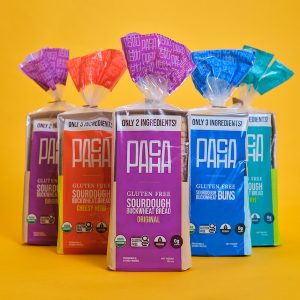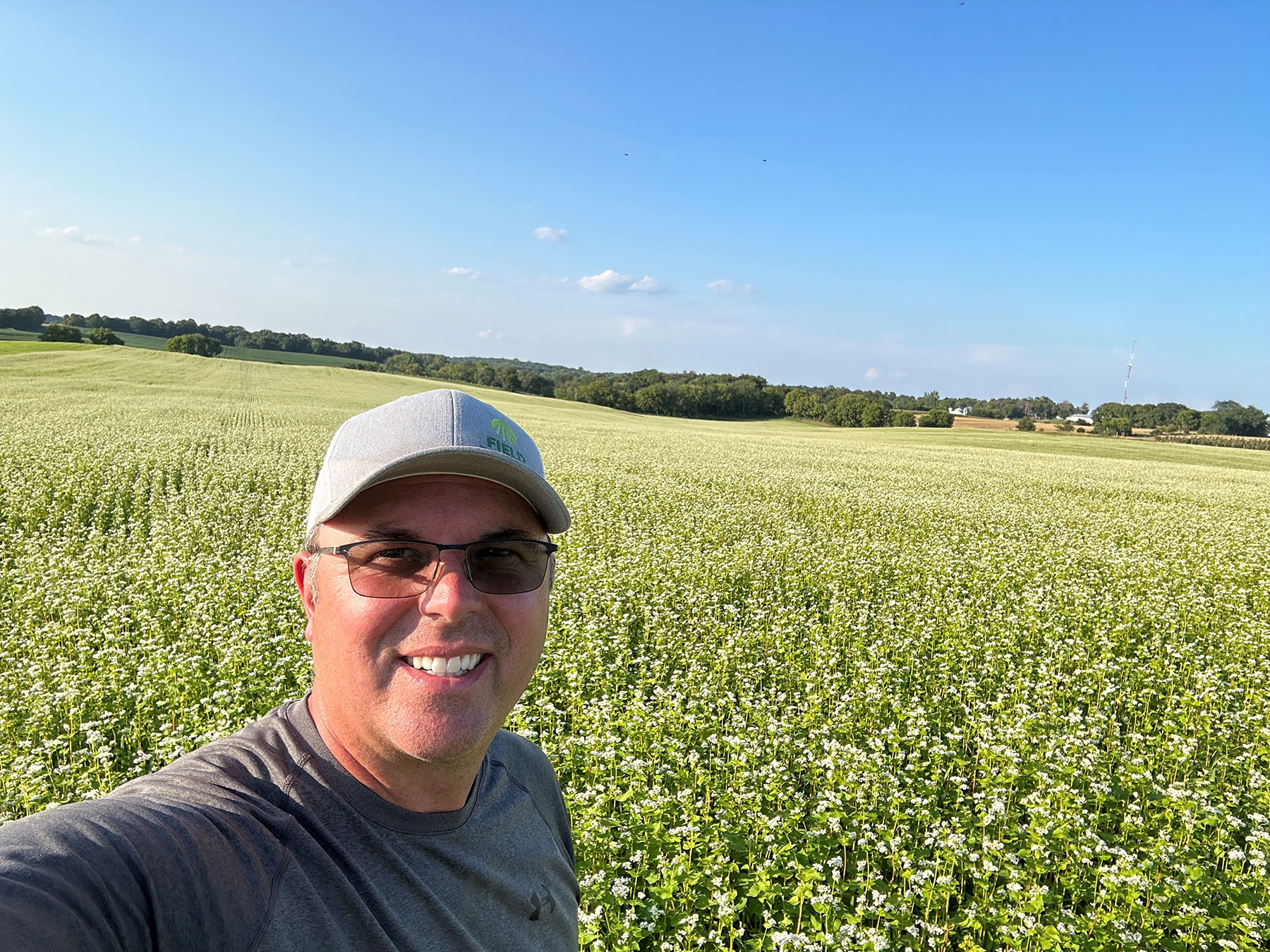John Strohfus takes on the risks of building direct farmer-to-brand regenerative supply chains
Maddie Hamann and Adam Hiner, co-founders of organic bread maker PACHA, had a problem. In 2023, they were sourcing organic buckwheat from a farmer in North Dakota for their gluten-free bread products. But they wanted to get their products certified regenerative in order to sell them in Whole Foods stores, and their farmer didn’t have that certification.
Building verified regenerative buckwheat supply chain

PACHA bread products are Soil & Climate Health Initiative Verified
Fortunately, some mutual connections led them to John Strohfus, a farmer in Hastings, Minnesota and owner of Field Theory, a business that connects food brands to regenerative farmers. Strohfus said he could help Hamann and Hiner. He was enrolled in the Soil & Climate Health Initiative (SCI) regenerative farming program. He offered to develop a supply chain for organic buckwheat that would also be verified regenerative through SCI. Strohfus contracted several farmers to grow 1000 acres of organic buckwheat for PACHA.
“PACHA has one primary ingredient—buckwheat. It is organic. They looked to me who didn’t have that supply chain, and I basically created it for them in one season,” he says.
For Strohfus, there was a risk in growing a crop he and his farmers hadn’t grown before but he took the risk.
Hamann says being certified organic is the “baseline” and adding the SCI verification was essential.
“For Adam and I, it’s about the ability to take care of the planet and to do that at a larger scale,” Hamann says. “If we keep going down the same road, we’re not going to have agriculture; we’re going to ruin our topsoil and have another dust bowl. For us, regenerative agriculture is the only way.”
PACHA’s products are certified organic and will display the Soil & Climate Health Initiative Verified logo later this year.
This year, Strohfus and his farmers have doubled their production to 2000 acres to supply PACHA. All acres will be SCI verified.
Strohfus, whose farm contains both organic and conventional land, says SCI is the “most pragmatic” regenerative certification available today. “The number one thing I like about SCI is that it’s open to conventional and organic growers.”
Hamann says their relationship with John Strohfus has been “really, really key for us.”
This wasn’t the first regenerative supply chain Strohfus created. In 2020, Simple Mills, which makes gluten-free crackers and cookies, contacted Strohfus and asked if he could grow organic sunflowers for a new cracker product the company was developing. Strohfus reached out to two other farmers in his network to see if they could also grow the sunflowers. He also contacted a processor in North Dakota who agreed to clean and dehull the sunflowers. In this way, Strohfus put together a value chain to produce organic sunflowers for Simple Mills’ Organic Seed Flour cracker product, which launched in 2021. He still supplies Simple Mills with organic sunflowers. He also supplies SCI Verified sunflower protein to muesli manufacturer Seven Sundays.
Strohfus says such farmer to brand relationships create a win-win situation for everyone.
“The food brands are seeking more transparency. They want to understand the agriculture system more,” he says. “The farmer wants to feel better about where their crop production is going, and they’re feeling better about new opportunities and being able to control their own destiny a little more.”
The shorter, more transparent supply chain also benefits consumers who learn more about how their food is produced.
Challenge selling buckwheat flour
But such regenerative supply chains are not without challenges. The buckwheat for PACHA’s bread is processed into groats, flour, and hulls. PACHA uses the groats, the hulled seeds of the buckwheat plant, for their bread products. Flour is the other main product of buckwheat processing but buckwheat flour has less demand and sells for a lower price than groats. According to Strohfus, whole ground buckwheat flour is used to make soba noodles and baking mixes. But most of the soba noodle manufacturers are located outside the U.S., which creates logistical and cost challenges to supply such manufacturers. Companies like Bob’s Red Mill and Arrowhead Mills sell organic buckwheat flour but those companies use buckwheat flour from the whole grain, which is different from Strohfus’s flour.
“For the amount of volume they use, sometimes they don’t want to mess with evaluating a slightly different flour specification,” Strohfus says. “But we can likely match the specifications if we have a willing partner to work with us.”
Thus, the challenge of building supply chains for regenerative products, which, while growing, is still a niche market.
“It’s clear to me that the brands, especially in the natural products industry, are seeking this (regenerative) supply chain, but it doesn’t exist at any sort of scale,” Strohfus says. “It’s just in its infancy, which is exciting and also stressful.”
What is needed to build regenerative supply chains? Planning and patience, Strohfus says. “We need to find the right brands that can be patient. Brands that are willing to work across multiple growing years to match the supply with their demand forecast.”
Paying farmers to use regenerative farming methods and be certified regenerative is also essential. “Brands that are willing to pay a premium; that’s number one,” Strohfus says.
Maddie Hamann sees the regenerative movement growing. “It’s hard for me to imagine a world in which regenerative agriculture doesn’t get any more recognition than it currently does,” she says. “I think there’s momentum in that direction, and I feel that we’re on the leading edge of a movement.”





